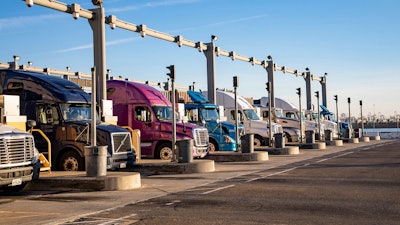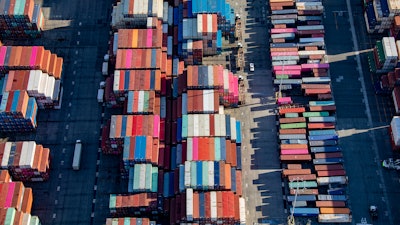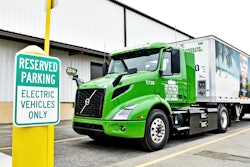
To get more freight moving out of the Port of Miami, East Florida Hauling began offering drivers bonuses of up to $1,000 a day to wait in long lines for hours on end.
For some, the extra money still isn’t enough to make up for the loss of bathroom breaks, decent meals and, most importantly, peace of mind.
“They just won’t go because of the line and while they’re waiting in line, they get desperate,” said East Florida Hauling controller Lissette Lesmes.
 Leaders at the Ports of Los Angeles and Long Beah are hoping that a new container fee created for ocean carriers will help move freight out faster. Various industry leaders aren't so sure.Port of Los Angeles
Leaders at the Ports of Los Angeles and Long Beah are hoping that a new container fee created for ocean carriers will help move freight out faster. Various industry leaders aren't so sure.Port of Los Angeles
East Florida Hauling’s efforts to move more freight at a time of unprecedented container congestion at America’s ports is yet another example of how private enterprise is attempting to keep products flowing into the hands of U.S. consumers who are gearing up to buy even more imported TVs, cell phones and laptops as the holidays roll into view.
[Related: LA ports symptom of larger supply chain problem]
Government efforts have also been underway to smooth out supply chain snarls, which threaten to keep holiday presents stuck in a pile of containers. The latest tactic? The Ports of Los Angeles and Long Beach, prominent members of the Biden-Harris Supply Chain Disruptions Task Force, announced a new fee that penalizes ocean carriers for letting shipping containers linger too long at the ports.
“In the case of containers scheduled to move by truck, ocean carriers will be charged for every container dwelling nine days or more,” the Port of Los Angeles states on their website. “For containers moving by rail, ocean carriers will be charged if the container has dwelled for six days or more. Beginning Nov. 1, the ports will charge ocean carriers with cargo in those two categories $100 per container, increasing in $100 increments per container per day.”
Uncle Sam to the rescue?
Pressuring ocean carriers with container fees may do little to motivate them to move cargo any faster, critics say, since the measure does not preclude carriers from simply passing along those new fees to importers who, in turn, would pass those costs on to customers.“All of these costs are being funneled down to the importers and to the products we sell,” a trucking equipment importer told CCJ on condition of anonymity. “Not sure fees will move the backlog along any. Issues are getting empties back on ships back to suppliers. I understand the empties are being stacked four and five high in residential neighborhoods now.
“[California Governor Gavin Newsom] is looking to lease space to store these until they can be loaded and shipped back,” the importer continued. “Also allowing owner-operators to pick up containers is also part of the solution that has not been looked at yet.”
[Related: Economist says trucking short 80,000 drivers]
As record numbers of containers keep piling up, acquiring more space for operations may prove more beneficial in alleviating congestion than tacking on additional fees.
“Since the ports are capacity constrained, creating space on the ground to expedite ship-to-shore throughput appears to be the next logical step in working through the backlog of containerships waiting to be offloaded,” said ACT Research President and senior analyst Kenny Vieth.
Oakland Port Services operations manager Bill Aboudi said imposing container fees on ocean carriers could prove effective in moving cargo faster and freeing up needed chassis so long as the shippers are not permitted to pass along those fees to others.
“As long as they make sure they don’t pass it on to the [cargo owners], it will light them up,” Aboudi said. “They will bend over backwards to get that cargo out of there.”
If ocean carriers increase efforts to move cargo, it will in turn free up chassis, Aboudi said, which are sitting idle among thousands of containers.
“The containers are on the chassis and there’s a chassis shortage,” Aboudi said, “and the people that can really do something about it are the steamship lines because they’ll bring in feeder vessels and take their empty containers away. They’ll free up the chassis.”
Siegfried Adam, director of business development at customs house broker Peter Wittwer North America, doesn’t see the container fees doing much to move out freight from the Southern California ports, which top the nation’s list for freight volume.
“It won’t do much for the situation in L.A. immediately, though long-term it may,” Adam said. “The problem is no matter if you charge $100 or $500, all of these costs are handed down to the consumer. And with price levels like they are right now, no one fears another couple $100s.
“It just goes to show that no one can really provide an immediate solution,” Adam continued. “It’s just making more money in the process, unless you send everyone back to work. It’s the warehouses and truckers that cannot keep up, but government regulations are preventing progress to mitigate this issue.”
No stranger to port challenges, Senator Rick Scott (R-Fla.), former governor of Florida, said the Biden administration is doing more harm than good when it comes to taking on historic log jams at the ports.
“They do nothing to fix the supply chain,” Scott told CCJ. “You have the Democrats paying people to not work. Guess what? You’re going to get fewer workers. Look at what’s going on. We have all these job openings and we don’t have enough workers now.”
While governor of Florida, Scott said he stayed in touch with supply chain leaders, particularly when strong storms threatened and disrupted the flow of goods. His biggest takeaway?
“It’s almost always something the government’s doing is causing problems,” he said. “The private sector’s pretty smart. They’ll figure this out. They’ll pay people more money. They’ll do all these things, but then there’s always these limitations by government.”
In a statement to CCJ, Scott’s staff said the senator is calling for Transportation Secretary Pete Buttigieg and Commerce Secretary Gina Raimondo “to show up and testify in the Senate Commerce Committee on how the Biden administration is working to address these supply chain issues instead of pointing fingers and shifting costs onto consumers.”











